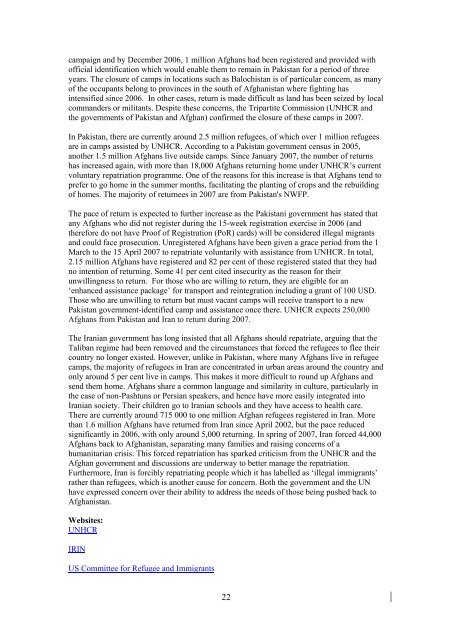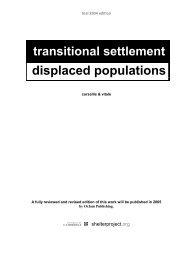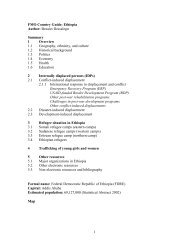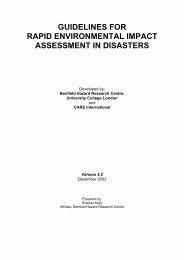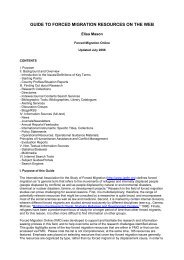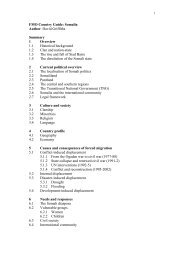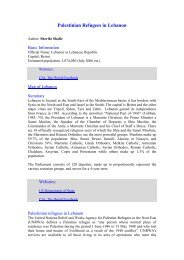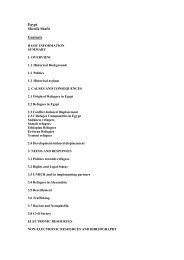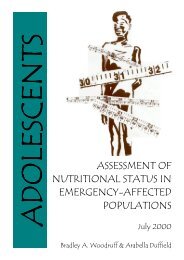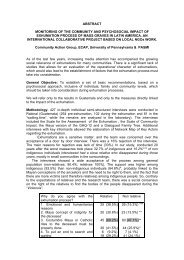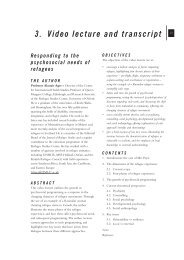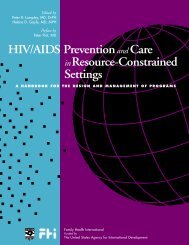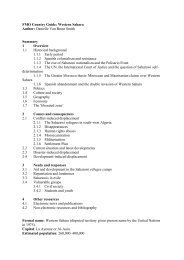Afghanistan. - Forced Migration Online
Afghanistan. - Forced Migration Online
Afghanistan. - Forced Migration Online
Create successful ePaper yourself
Turn your PDF publications into a flip-book with our unique Google optimized e-Paper software.
campaign and by December 2006, 1 million Afghans had been registered and provided with<br />
official identification which would enable them to remain in Pakistan for a period of three<br />
years. The closure of camps in locations such as Balochistan is of particular concern, as many<br />
of the occupants belong to provinces in the south of <strong>Afghanistan</strong> where fighting has<br />
intensified since 2006. In other cases, return is made difficult as land has been seized by local<br />
commanders or militants. Despite these concerns, the Tripartite Commission (UNHCR and<br />
the governments of Pakistan and Afghan) confirmed the closure of these camps in 2007.<br />
In Pakistan, there are currently around 2.5 million refugees, of which over 1 million refugees<br />
are in camps assisted by UNHCR. According to a Pakistan government census in 2005,<br />
another 1.5 million Afghans live outside camps. Since January 2007, the number of returns<br />
has increased again, with more than 18,000 Afghans returning home under UNHCR’s current<br />
voluntary repatriation programme. One of the reasons for this increase is that Afghans tend to<br />
prefer to go home in the summer months, facilitating the planting of crops and the rebuilding<br />
of homes. The majority of returnees in 2007 are from Pakistan's NWFP.<br />
The pace of return is expected to further increase as the Pakistani government has stated that<br />
any Afghans who did not register during the 15-week registration exercise in 2006 (and<br />
therefore do not have Proof of Registration (PoR) cards) will be considered illegal migrants<br />
and could face prosecution. Unregistered Afghans have been given a grace period from the 1<br />
March to the 15 April 2007 to repatriate voluntarily with assistance from UNHCR. In total,<br />
2.15 million Afghans have registered and 82 per cent of those registered stated that they had<br />
no intention of returning. Some 41 per cent cited insecurity as the reason for their<br />
unwillingness to return. For those who are willing to return, they are eligible for an<br />
‘enhanced assistance package’ for transport and reintegration including a grant of 100 USD.<br />
Those who are unwilling to return but must vacant camps will receive transport to a new<br />
Pakistan government-identified camp and assistance once there. UNHCR expects 250,000<br />
Afghans from Pakistan and Iran to return during 2007.<br />
The Iranian government has long insisted that all Afghans should repatriate, arguing that the<br />
Taliban regime had been removed and the circumstances that forced the refugees to flee their<br />
country no longer existed. However, unlike in Pakistan, where many Afghans live in refugee<br />
camps, the majority of refugees in Iran are concentrated in urban areas around the country and<br />
only around 5 per cent live in camps. This makes it more difficult to round up Afghans and<br />
send them home. Afghans share a common language and similarity in culture, particularly in<br />
the case of non-Pashtuns or Persian speakers, and hence have more easily integrated into<br />
Iranian society. Their children go to Iranian schools and they have access to health care.<br />
There are currently around 715 000 to one million Afghan refugees registered in Iran. More<br />
than 1.6 million Afghans have returned from Iran since April 2002, but the pace reduced<br />
significantly in 2006, with only around 5,000 returning. In spring of 2007, Iran forced 44,000<br />
Afghans back to <strong>Afghanistan</strong>, separating many families and raising concerns of a<br />
humanitarian crisis. This forced repatriation has sparked criticism from the UNHCR and the<br />
Afghan government and discussions are underway to better manage the repatriation.<br />
Furthermore, Iran is forcibly repatriating people which it has labelled as ‘illegal immigrants’<br />
rather than refugees, which is another cause for concern. Both the government and the UN<br />
have expressed concern over their ability to address the needs of those being pushed back to<br />
<strong>Afghanistan</strong>.<br />
Websites:<br />
UNHCR<br />
IRIN<br />
US Committee for Refugee and Immigrants<br />
22


